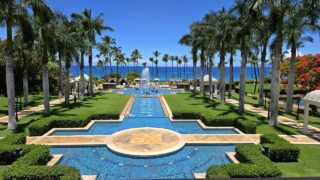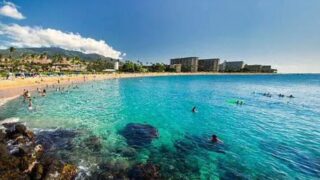Hilton is expanding on Maui while the island’s tourism growth is stuck. These new hotels promise more options for travelers, but they also raise pressing questions about the future of Maui’s tourism after the Lahaina Fire. We’ve seen the housing market under stress, growing tension between development and community, and visitors speaking out that they no longer feel welcome as they did in the past.
The global hotel giant is bucking the trend and sees a brighter future on Maui with these two new properties: the Hampton Inn & Suites Maui North Shore in Kahului opening May 2025 (located on the site of the old Maui Palms hotel) and the rebranding of its neighbor, Maui Seaside Hotel, into a Tapestry Collection property by 2026.
Hilton’s Maui expansion: a win for tourists, or a loss for residents?
This transformation reflects a broader trend on the island: as luxury branded accommodations dominate, locally-owned hotels are being squeezed out, leaving Maui’s tourism landscape increasingly in the hands of global corporations.
The new Hampton Inn & Suites Maui North Shore will bring 136 rooms to the island, catering to travelers seeking “affordability” starting at $500 plus taxes and fees nightly.
Meanwhile, Hilton’s rebranding of the Maui Seaside Hotel into a Tapestry Collection by Hilton, set to open next year, could reshape North Maui’s hotel scene. Once a humble haven for budget-conscious travelers, and BOH editors include themselves in that group, the Maui Seaside Hotel is poised to become a boutique property with a far heftier still unknown price tag.
Maui tourism and the road not taken.
Maui has long struggled to balance the needs of its visitors with those of its residents, and Hilton’s latest developments risk tipping the scales further. While tourism brings more revenue, it also places an unsustainable strain on the island’s limited resources including staffing, infrastructure, and its housing market. Frustration among residents is mounting, with many fearing that Maui’s unique character is being traded away for corporate profits and cookie-cutter developments.
The transformation of the Maui Seaside Hotel is a case in point. As it joins Hilton’s upscale Tapestry Collection, it becomes another symbol of the growing corporate grip on Maui’s tourism economy. The shift caters to wealthier travelers while some critics argue that it worsens housing challenges for working residents.
With short-term rentals under increasing regulation—or, more accurately, the fear thereof—large hotel chains are seizing the opportunity to rapidly dominate the market—often at the expense of smaller businesses that once defined the island’s hospitality scene.
A corporate takeover: How Hilton is reshaping Maui’s tourism.
Hilton’s latest moves underscore a growing shift in Maui’s tourism landscape. As hotel chains like Hilton expand their footprint, the island’s tourism identity is evolving, including a creeping sense of standardization that threatens to overshadow the authenticity that is emblematic of Hawaii.
This shift raises a pressing question: Who benefits from these developments? On one hand, more hotels might offer much-needed options for Valley Isle travelers. On the other hand, unchecked growth risks amplifying Maui’s most pressing challenges about tourism melding with the community.
What does this mean for visitors?
Hilton’s arrival on Maui brings new options for travelers. By Hawaii standards, the Hampton Inn & Suites in Kahului offers a mid-range choice for those who want to stay close to the airport and the island’s central hub. But the bigger question is will these new hotels deliver any genuine Hawaii experience or cater to the predictable comforts of homogenized mainstream tourism?
For those seeking intimacy and Hawaiian authenticity, this shift could feel like a step further from the Maui they came to find and love—or worse, it might drive even more visitors into the already contentious vacation rental market or away from the island entirely.
A sustainable future for Maui tourism: can Hilton help?
As Hilton expands on Maui, a crucial question arises: Can global hotel giants like Hilton play a meaningful role in ensuring the island’s sustainable tourism future? While it’s hard to imagine these corporations tackling Maui’s housing crisis or fully addressing the frustrations of locals, there is potential for them to reduce tourism’s existing harm.
Rob F aptly summed up some concerns with Hilton operations, stating that “management pushes the envelope on rates, the nightly resort fee… and parking,” while the overall value continues to decline. If Hilton aims to make a positive impact, focusing on issues like affordability and accessibility for a broader base of visitors is vital.
Hilton could take tangible steps to soften tourism’s negative impacts. For instance, implementing robust sustainability initiatives, paying local workers more, and sourcing goods from local businesses could create a more balanced relationship within the community.
However, as Warren remarked about Hilton Hawaiian Village (HHV) on Oahu, overcrowding and a decline in service quality already demonstrate that these large chains often prioritize revenue over a truly enriching guest experience. “It’s difficult to find places at the pool anymore and it’s crowded. Staff are overwhelmed and the service has declined,” he said. If this is a preview of what’s to come at Hilton’s Maui properties, there’s reason to worry.
Read: What Hilton Hawaiian Village Gets Right—and So Very Wrong.
Then there’s the tension between residents and the hotel industry, a recurring headache for the island. Residents like J have expressed frustration, claiming the County’s short-term rental restrictions effectively “give the hotels a monopoly.”
While hotels like Hilton capitalize on the reduced competition, locals who once relied on income from STRs are seeing their livelihoods threatened. This dynamic risks alienating residents while deterring visitors who prefer the flexibility of vacation rentals.
Others, like Chuck L, emphasize that this creates a lose-lose situation, adding, “Without vacation rentals on Maui, the hotels have the monopoly and are having their way. And those profit dollars leave Hawaii’s economy. How’s this strategy working out?”
The social fabric of Maui is also undeniably affected. For Hilton to truly contribute to a sustainable future, it must abandon treating the local workforce as a secondary concern and instead invest in their well-being and professional growth.
Yet, for Hilton to lead this charge, it must go beyond business as usual. It must trade a profit-driven mindset for one that puts cultural preservation, environmental stewardship, and community engagement front and center.
Without this shift, Maui risks falling further into the cycles of overdevelopment and community resentment that have plagued its tourism economy for decades.
The bigger picture of tourism on Maui.
While Hilton’s two new properties are just a tiny part of a larger picture of both Maui tourism and throughout Hawaii, they symbolize broader island tourism trends. The island’s rapid global commercialization threatens its unique identity, with residents and visitors questioning whether any community’s values are being upheld. Tourism is a double-edged sword in economically challenged Hawaii—while it provides economic benefits, it also comes with significant costs.
We welcome your input!
Get Breaking Hawaii Travel News







Resort fees and taxes are out of control, and in the US you get Far worse service than you do abroad. I’m in South Africa currently and my hotel has offered to book literally every excursion I’ve done. If you asked the front desk at an American hotel to book stuff for you they’d roll their eyes. I didn’t even ask here in South Africa the offered immediately when I checked in.
Maui is getting what they are asking for or tolerating…the maybe end of STRs for higher end unaffordable resorts (kick-backs in play?)…if this persists than tourists like those that post comments here will move on to something else that does not include Maui…
Was sorry to see the old Maui Palms Hotel bite the dust, however it had needed a Major renovation/refresh for a long time. It was the first hotel I stayed at as a teenager in 1965, so it brings back great memories, especially its always windy location.
$500+ per night is ridiculous for a cookie cutter Hampton Inn, and the pictures of the new property shows just that.
One could stay at the Hilton Kaanapali Vacation Club for a hundred dollars less per night, and have a much larger room. Sadly, Maui is moving in the wrong direction in so many ways. When the entitled 1% get tired of the $1000+ per night rooms, what happens next with Maui’s economy. The average income American has now decided to travel elsewhere, and Maui is the big loser in all respects. Very sad!
Since when is $500 a night affordable??? That is a joke.
“Affordability” starting at $500 plus taxes and fees nightly ???!!! So you’re looking at $650 a night minimum. Since when does that classify as “affordable”? It’s jaw dropping idiocy like this that shows just how far out of touch these corporations are with 90% of America. Maui is already overloaded with hotels and resorts. Rebranding elderly properties to squeeze extra juice out of an already squeezed husk in breathless anticipation of the STR market being restricted is just plain predatory. It’s obvious that there’s no place for everyday Mr. and Mrs. Middle America in the PTB plans for Maui…
Best Regards
I don’t like the Hilton in Waikiki because it’s like a fake city in a city. Furthermore, the Hilton Vacation Club in Kahului doesn’t even bother getting a restaurant/bar where the crowd who is mostly retired and over 60 could move to the music while listening to our favorite musician. The only reason locals go there is for the music, but we were told to sit down or stand still when the music plays …I spoke to the manager and she said “it a Maui law” …reallly? So how come there are much smaller bars in Kihei and Wailuku where dancing is allowed.
I would not pay $500 a night to stay in a Kahului hotel; In fact I would not pay $500 a night for any hotel in Maui. i have always relied on a vacation rental condo since I started going to Maui yearly in 1991. But now with the new law restricting/banning West Side Maui vaation rentals supposedly to start June 1, it appears that Maui is no longer in the cards for me. I agree with Chuck L. that the new law creates a monopoly for the Maui Hotel industry and makes Maui a no-go for me.
Hotels are not the problem. It is obvious that Maui is no longer welcoming to tourists. There are many places in the world who are. After coming to Maui on and off for 40 years, we decided on Europe last year and a cruise this year. It’s sad to be spurned by the place we love, but we are finding people elsewhere quite welcoming.
Hilton owned by real estate conglomerate. Two additional hotels. No affordable housing. Typical everyone knew this was gonna happen. $500 a night for a hotel room is not affordable. This news makes me sick.
Are the people who were displaced on Maui angry at their government officials yet? If they aren’t, they should be. All the crying and whining about no affordable housing and the only thing being built are more hotels. If this weren’t so pathetic and sad it would almost be funny how out of touch with reality the people who approve these things are. Want to know where all the fees and taxes are going….look no further than the pockets of the politicians and hotel executives.
Hawaii’s local governments are just an “old boys club” to give choice jobs to connected locals, with not a lot of accountability.
The only solution here would be to support a politician willing to reform local government and staffing. You’d then have the resources to tax the resorts and fund affordable housing for locals, which I think is what you are advocating for?